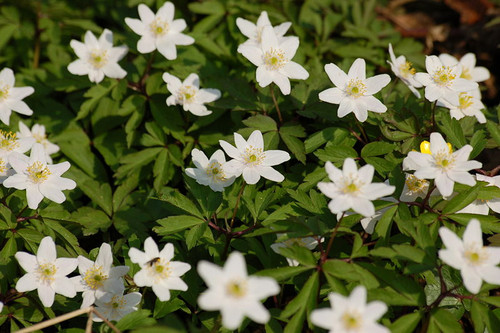Plant Overview
Snowdrops are among the first bulbs to bloom in spring and can form impressive carpets of white in time. Not native to the UK, but they have been in the country for so long that they are naturalised and appear in the wild and gardens alike across Great Britain.
Only available for a short period in winter, you are buying ten 'in the green bulbs' for the price stated above. Add 2 to the basket to buy 20 bulbs and so on. 'In the green' means that you are buying bulbs which are shooting and/or have leaves (which is the most reliable means of transplanting snowdrops). Plant immediately in the ground or in containers.
DELIVERY IS FREE FOR BULB-ONLY ORDERS. OR COMBINE WITH PLANT ORDERS FOR OUR STANDARD SHIPPING RATES.
Snowdrops generally flower between January and late March.
Height: 15cm
Common names: Snowdrop; Candlemas bells; Candlemas lily; Common bells; Fair Maids of February; Little Sister of the Snows; Purification Flower. Also known in parts of Yorkshire as Snow Piercers.
The generic name Galanthus, from the Greek gala (milk) and anthos (flower), was given to the genus by Carl Linnaeus in 1735. He described Galanthus nivalis in his Species Plantarum published in 1753. The epithet nivalis means "of the snow", referring either to the snow-like flower or the plant's early flowering.
The first record of the common name Snowdrop, appears in the 1633 edition of John Gerard's Great Herbal.
Myth, Legend and Tradition
A Christian myth tells that when Adam and Eve were banished from Eden, Eve was despondent and sad. After the wonder of Eden she found her new home cold barren. Summer had turned to winter and driving snow covered the land and an angel saw her and took pity upon her. He breathed onto the falling snowflakes and turned them into snowdrop flowers. The tapering blossoms bowed themselves humbly a Eve's feet and each open bloom revealed a touch of green promise for the return of summer.
The snowdrop is sometimes called the 'Candlemas flower, probably because it comes into flower about the time of Candlemas, 2 February.
The snowdrop in purest white array,
First rears its head on Candlemass Day.
An alternative explanation comes from another Christian myth which reminds us that candles are blessed at Candlemas as Simeon, the priest, had said that Christ would be the Light of the World. This was the time when Jesus was taken to be presented at the temple at Jerusalem and, according to the myth, snowdrops sprang up his footsteps.
Candlemas, in past times, marked the latest time by which the Christmas greenery should be removed from churches. It would be replaced with images of the Madonna and snowdrops as emblems of her purity. In folklore it was said that if the Christmas greenery was left in the church any later than Candlemas goblins would appear and fill the church. There would be one goblin for every leaf left from the Christmas decorations.
It was said that you should always pick snowdrops before St Valentine's Day to have any hopes of being married in that year.
A dream of snowdrops suggests that you should not continue to conceal your secret, but will be happier if you confide in someone.
Advantages of 'in the green' bulbs:
- root system is already developed
- you can see where you plant, avoiding bare patches and gluts
- easy to handle and no guessing which way up to plant
- plants establish much quicker and more reliably than dry bulbs
- plant from mid-January through to April
Photo 1: Gabe Schp, CC0, via Wikimedia Commons








